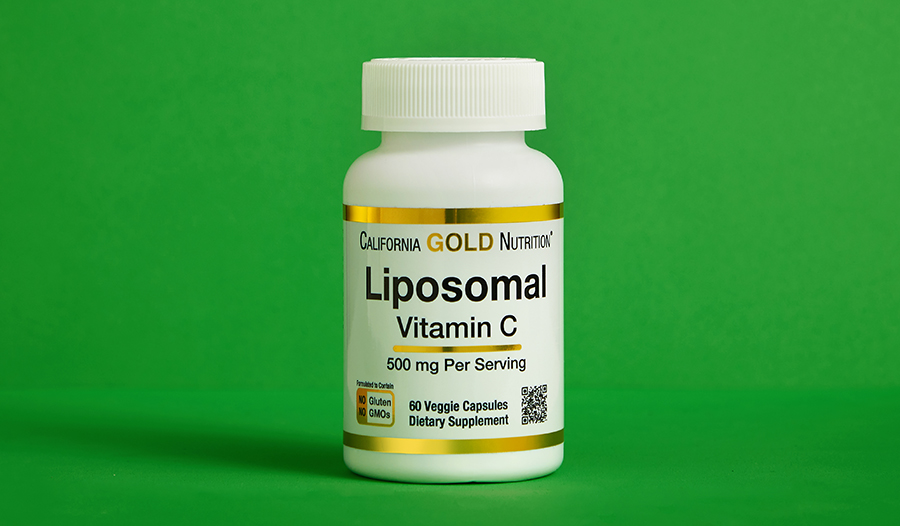Can Liposomal Vitamins Offer More Health Benefits?

Liposomes were first described in 1965 and were soon after applied to delivering various substances to human cells. Medications, vaccines, and vitamins are a few examples of substances delivered via liposomes. Liposomes are a preferred delivery method because they can carry both hydrophilic and hydrophobic agents and protect them from being metabolized before reaching the target cells.
What Is A Liposome?
While we have established their usefulness in substance delivery, you may still be wondering what a liposome is.
A liposome is a spherical vesicle, or bubble, with a phospholipid bilayer, or outer coating with two fat layers. The lipid bilayer is the same structure our cell membranes are made of. A cell membrane is the outer coating of an animal or human cell. The liposome vesicle can be filled with drugs, vitamins, disease treatments, and more.
What Are The Benefits Of A Liposome?
There are several benefits of delivering a vitamin, vaccine, or medication via a liposome.
The most prominent benefit is the ability to target certain cells in the body for delivery of the encapsulated material. This can be accomplished in two ways. The first way is by passive targeting, where characteristics of the liposome can be altered so that when it comes in contact with the desired cell, it can easily be engulfed and the contents released into the target cell. General characteristics like fluidity, softness, size, and hydrophobicity or hydrophilicity can be altered in passive targeting.
The second way a liposome can be designed to target specific cells in our bodies is via active targeting. In active targeting, the target cell is more specifically recognized on the molecular level. This is done by creating a specific recognition site on the liposomal surface that will interact with a receptor on the target cell membrane.
Whether through active or passive targeting, once the liposome and target cell come into contact, the liposome will adhere to the target cell's surface. Once they are bound, the liposome is taken into the cell and digested by enzymes within the cell. The substance, such as the vitamin or medication, is then distributed throughout the cell's internal structure. Now the substance is inside the target cell and can perform or assist in its intended function and purpose for the targeted cell.
Delivering vitamins and medications via liposomes also have the benefit of reducing unwanted toxic side effects and increasing treatment efficacy.
4 Types Of Liposomal Vitamins
Vitamin C
Vitamin C is well known to have liposomal delivery options. However, other liposomal vitamins are becoming more popular including vitamins A, E, D, and K. Vitamin C is water-soluble, while vitamins A, E, D, and K are fat-soluble.
Liposomal vitamin C has more bioavailability than regular vitamin C, meaning it is better absorbed and therefore more readily available for use in the body because of the lipid bilayer surrounding it. This lipid layer also helps to keep the vitamin from being broken down in the digestive system.
Vitamin C is important for immune health and is a powerful antioxidant that can help protect your body from chronic illness. It may also help manage high blood pressure and keep your heart healthy. With additional benefits of protecting your brain, memory, and cognition as you age, liposomal vitamin C is ideal to include in your daily regimen.
Vitamin C deficiency is rare, and symptoms include coiled or corkscrew-shaped body hair, bright red hair follicles, bumpy skin, and slow healing wounds.
A Quick Guide To Vitamin C: Read more.
Vitamin D
Like its water-soluble counterpart, liposomal vitamin D is also more bioavailable than traditional vitamin D. Also, like vitamin C, vitamin D is needed for good immune health. With liposomal technology, vitamin D binds easily with cell membranes, allowing the vitamin to be delivered intracellularly for superior absorption and bioavailability.
Vitamin D is needed for good bone, teeth, and muscle health, along with proper calcium absorption. It is also touted to be an important factor in helping your body and systems working well and avoiding the development of scores of chronic illnesses.
Vitamin D toxicity symptoms include elevated blood calcium, fatigue, forgetfulness, nausea, vomiting, slurred speech, and poor appetite. Kidney failure, bone loss, and gastrointestinal problems like constipation, stomach pain, and diarrhea can also occur with high vitamin D levels.
Vitamin K
Liposomal vitamin K may be especially effective for those with a vitamin K deficiency. Vitamin K is important for normal blood clotting, healthy bones, and protein synthesis. With enhanced bioavailability, those with a deficiency can get the vitamin into the cells more easily and quickly.
Vitamin K Deficiency Symptoms:
- Easy bleeding
- Heavy menstrual periods
- Bleeding from the gastrointestinal tract
- Blood in the urine
- Blood in the stool
- Excessive bleeding from wounds, injections, or surgical sites
- Easy bruising
Vitamin K toxicity can be a critical condition with anemia due to ruptured red blood cells. The ruptured cells can lead to jaundice which can also lead to brain damage in newborns. Vitamin K toxicity is rare because it is broken down quickly and excreted from the body. However, because it is fat-soluble, it can build up in the body and potentially cause toxicity like other fat-soluble vitamins, including vitamins A, D, and E.
Vitamin E
Liposomal vitamin E is a powerful antioxidant that can protect your cells from free radicals. Free radicals may be associated with cancer and cardiovascular disease. Vitamin E also promotes healthy immune function, skin, and eyes.
Vitamin E deficiency may cause loss of feeling in the arms and legs, muscle weakness, loss of body movement control, and vision problems due to nerve and muscle damage. A weakened immune system is also a sign of low vitamin E levels.
Too much vitamin E can also cause problems, including headache, nausea, diarrhea, fatigue, gastric disorders, and easy bruising or bleeding.
Liposomal Vitamin Combinations
Vitamins that have synergistic qualities make good liposomal combinations.
Liposomal vitamins D3 and K2 make a great combination for bone health and calcium metabolism. While both vitamins are fat-soluble, vitamin D3 helps with calcium absorption, and vitamin K2 helps the calcium get to the proper tissues that need it.
Vitamin K2 activates various proteins that help balance calcium in the body. Together, vitamins D3 and K2 are more effective in preventing bone loss than when taken separately.
Another great vitamin combination is liposomal vitamins A, D3, E, and K2. These are the fat-soluble vitamins that all play a major role in health and wellness.
We have discussed the benefits of each of these liposomal vitamins accept vitamin A. Vitamin A helps protect your eyes from night blindness and age-related decline. Vitamin A may also support clear skin and minimize the risk of certain chronic illnesses while promoting healthy reproduction, bone, and immune health. Liposomal vitamin A is also key for good lung and kidney function.
Vitamin A toxicity is possible due to its fat-soluble nature. Signs of vitamin A toxicity include nausea, dizziness, headache, coma, and possibly even death. High doses of vitamin A can also cause congenital disabilities, so pregnant women should not take high doses of vitamin A.
A harmless yet interesting effect of high amounts of beta-carotene, a precursor of vitamin A, is orange-yellow skin. Beta-carotene is converted to vitamin A according to the body’s needs.
Liposomal Vitamins, The Bottom Line
Because of their increased bioavailability, liposomal vitamins offer a higher therapeutic value compared to non-liposomal vitamins.
Many vitamins are available in liposome form, including vitamins C, A, E, D, and K. Those with a deficiency in these vitamins can benefit from the increased absorption potential of liposomal vitamins.
Before taking any vitamin, especially fat-soluble vitamins A, E, D, and K, talk to your doctor to make sure you are taking the right vitamins for your health needs and the right amount to avoid potential interactions and possible toxicity.
Liposomal Vitamin C Boosted Recipes For Better Antioxidant Absorption: Read more.
References:
- Application of liposomes in medicine and drug delivery, Hadis Daraee,Ali Etemadi,Mohammad Kouhi,Samira Alimirzalu &Abolfazl Akbarzadeh, Pages 381-391 | Received 31 Jul 2014, Accepted 07 Aug 2014, Published online: 15 Sep 2014
- Kim MK, Sasazuki S, Sasaki S, Okubo S, Hayashi M, Tsugane S. Effect of five-year supplementation of vitamin C on serum vitamin C concentration and consumption of vegetables and fruits in middle-aged Japanese: a randomized controlled trial. J Am Coll Nutr. 2003;22(3):208-216. doi:10.1080/07315724.2003.10719295
- Knekt P, Ritz J, Pereira MA, et al. Antioxidant vitamins and coronary heart disease risk: a pooled analysis of 9 cohorts. Am J Clin Nutr. 2004;80(6):1508-1520. doi:10.1093/ajcn/80.6.1508
- Goodwin JS, Goodwin JM, Garry PJ. Association between nutritional status and cognitive functioning in a healthy elderly population. JAMA. 1983;249(21):2917-2921.
- Khadilkar SS. The Emerging Role of Vitamin D3 in Women's Health. J Obstet Gynaecol India. 2013;63(3):147-150. doi:10.1007/s13224-013-0420-4
- Schleicher RL, Carroll MD, Ford ES, Lacher DA. Serum vitamin C and the prevalence of vitamin C deficiency in the United States: 2003-2004 National Health and Nutrition Examination Survey (NHANES). Am J Clin Nutr. 2009;90(5):1252-1263. doi:10.3945/ajcn.2008.27016
- National Institutes of Health Office of Dietary Supplements Vitamin E Fact Sheet for Consumers, https://ods.od.nih.gov/factsheets/VitaminE-Consumer/
- van Ballegooijen AJ, Pilz S, Tomaschitz A, Grübler MR, Verheyen N. The synergistic interplay between vitamins D and K for bone and cardiovascular health: A narrative review. Int J Endocrinol. 2017;2017:7454376. doi:10.1155/2017/7454376
- National Institutes of Health Office of Dietary Supplements Vitamin A Fact Sheet for Consumers, https://ods.od.nih.gov/factsheets/VitaminA-Consumer/
DISCLAIMER:This Wellness Hub does not intend to provide diagnosis...
















































































 Table of Contents
Table of Contents
















